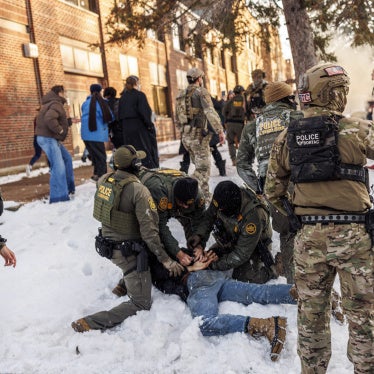On December 17, 2007, Human Rights Watch released its report, “Shutting Out the Critics,” which detailed violations of the rights to peaceful assembly and freedom of association in Jordan. Since then, the new government of Prime Minister Nader al-Dahabi withdrew a dangerous draft law regulating non-governmental organizations (NGOs) and promised to amend the law on public gatherings and, with the input of NGOs, draft a new law.
Several Jordanian journalists, however, sharply attacked Human Rights Watch’s report. Citing “national sovereignty,” critics rejected our recommendation that the United States and European Union condition a part of the hundreds of millions of dinars they give Jordan every year on government steps to respect and protect human rights. The US just increased its economic assistance by 48 percent compared to 2007.
On the point of aid conditionality, we need to be clear: Currently, there appear to be no specific human rights conditions for US and EU assistance to Jordan, although, as some critics acknowledge, there are a host of other conditions that donors impose, such as restricting or specifying areas of spending or changing certain governmental policies. Neither Jordan nor the US makes those conditions public. The critics also concede that Jordan has human rights problems that require amending existing legislation and changing government policy.
Our critics argue unconvincingly that Human Rights Watch improperly interferes in Jordan’s national sovereignty. They have voiced no objection to these other, albeit often unpublicized conditions, imposed by donors. They only seem to bristle at holding the government and donors publicly accountable to Jordan’s human rights commitments.
But as a matter of international law, including being a state party to the International Covenant on Civil and Political Rights, Jordan has a legal obligation to uphold the rights to assembly and association. There is no reason why the government cannot make those necessary changes to laws and policies and continue to receive foreign assistance.
Some critics object that the US has no moral authority to impose human rights conditions as it violates human rights itself. Others point out that US support for Israel indicates it has no interest in conditioning assistance on human rights concerns as a matter of principle. In December 2005 we urged US President Bush to withhold US aid to Israel in an amount equal to Israel's expenditures on the settlements and on the construction and maintenance of the West Bank portion of the wall. Human Rights Watch in 2007 also urged China – certainly no gold medalist in human rights – to impose sanctions on the Burmese gem trade following the crackdown on pro-democracy demonstrators in Rangoon. We also called upon China to support targeted sanctions against Sudan for its human rights abuses in Darfur.
There is no crisis in Jordan comparable to that in Palestine, Burma or Darfur. But Human Rights Watch’s recommendation is a call to donor and recipient alike to respect the fundamental human rights of ordinary people.







